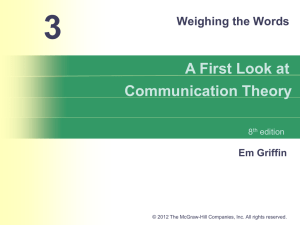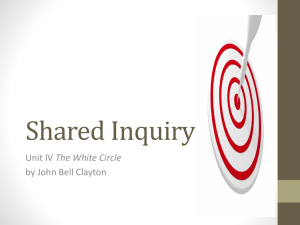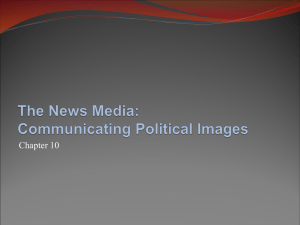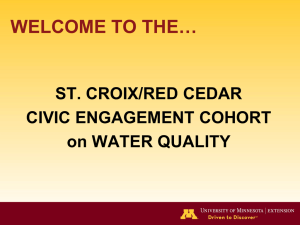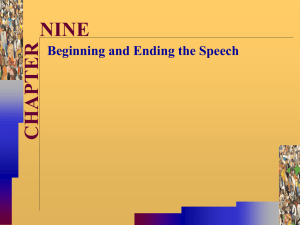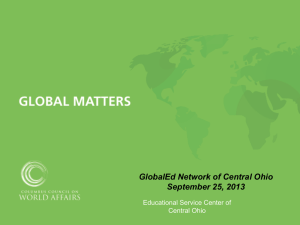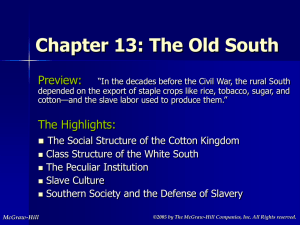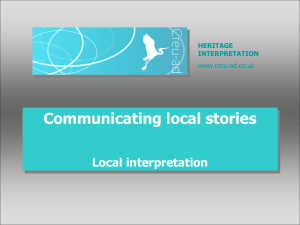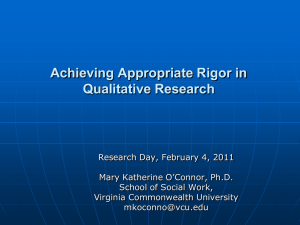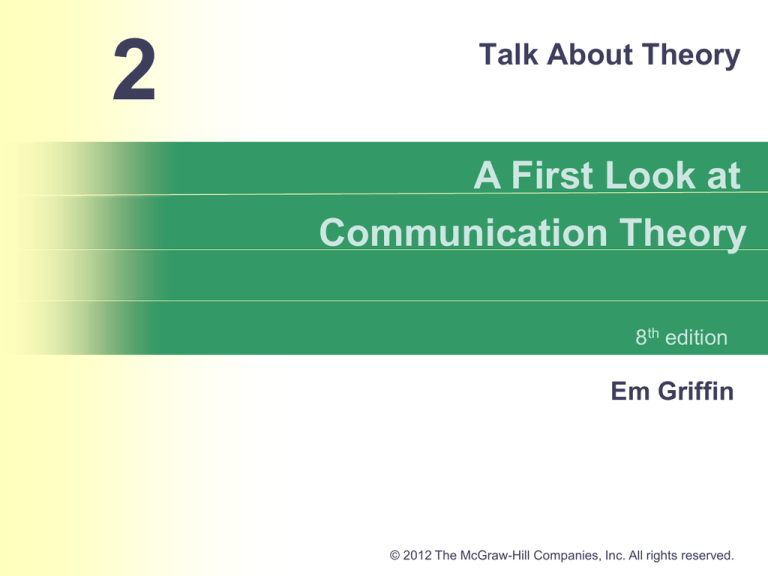
2
Talk About Theory
A First Look at
Communication Theory
8th edition
Em Griffin
© 2012 The McGraw-Hill Companies, Inc. All rights reserved.
Slide 2
Talk About Theory
Two Communication Scholars View a Diehard Fan
Objective or Interpretive: Sorting Out the Labels
Ways of Knowing: Discovering
Truth of Creating Multiple Realities?
Human Nature: Determinism or Free Will?
The Highest Value: Objectivity or Emancipation?
Purpose of Theory: Universal
Laws or Interpretive Guides?
Objective or Interpretive: Why Is It Important?
© 2012 The McGraw-Hill Companies, Inc. All rights reserved.
Slide 3
Talk About Theory
Glenn Sparks is a behavioral scientist
–applies the scientific method to
describe, predict, and explain recurring
forms of human behavior
Marty Medhurst is a rhetorician –
studies ways symbolic forms can be
used to identify with people, or to
persuade them to a certain point of view
© 2012 The McGraw-Hill Companies, Inc. All rights reserved.
Slide 4
Talk About Theory
Need to grasp crucial differences
between the objective and interpretive
approaches to communication
Glenn Sparks: behavioral
scientist, conducts experiments
Marty Medhurst: rhetorician; interpret texts
© 2012 The McGraw-Hill Companies, Inc. All rights reserved.
Slide 5
Two Communication Scholars
View a Diehard Fan
MasterCard “Priceless” campaign
Ad Week:
• “Peyton Manning is one of the few superstar
athletes who shows he can act in his
commercials. We’ve seen his cheerleaderfor-the-everyday guy before. This time he’s
rooting for the waitress who drops her tray,
the latte guy who’s burned by escaping
steam, and the movers who let a piano escape
down a hill. “That’s okay guys. They’re not
saying ‘boo,’ they’re saying moooooovers.’”
© 2012 The McGraw-Hill Companies, Inc. All rights reserved.
Slide 6
Two Communication Scholars
View a Diehard Fan
Glenn: An Objective Approach
Objective approach – assumption
that truth is singular and is
accessible through unbiased
sensory observation; committed to
uncovering cause-and-effect relationships
© 2012 The McGraw-Hill Companies, Inc. All rights reserved.
Slide 7
Two Communication Scholars
View a Diehard Fan
Glenn: An Objective Approach (continued)
MasterCard convinced Manning’s
celebrity appeal will rub off on
the public image of their credit card
Source credibility – perceived
competence and trustworthiness
of a speaker or writer that
affects how the message is received
© 2012 The McGraw-Hill Companies, Inc. All rights reserved.
Slide 8
Two Communication Scholars
View a Diehard Fan
Glenn: An Objective Approach (continued)
Hovland and Weiss suggest that expertise
and trustworthiness are two main
ingredients of perceived credibility
© 2012 The McGraw-Hill Companies, Inc. All rights reserved.
Slide 9
Two Communication Scholars
View a Diehard Fan
Glenn: An Objective Approach (continued)
Kelman: when people forge a body of
identification with a figure like Manning,
they’ll gladly embrace his persuasive pitch
• Identification – perceived role relationship
that affects self-image and attitudes; based
on attractiveness of role model, and
sustained if relationship remains salient
© 2012 The McGraw-Hill Companies, Inc. All rights reserved.
Slide 10
Two Communication Scholars
View a Diehard Fan
Glenn: An Objective Approach (continued)
Do viewers transfer Manning’s expertise
from the gridiron to credit cards?
• “I would want an objective test to
find out if celebrity appeals really work”
– Is ad campaign followed by increase in
new card applications or number of charges?
– Test whether ad has same effect on
viewers who do not know who Manning is
© 2012 The McGraw-Hill Companies, Inc. All rights reserved.
Slide 11
Two Communication Scholars
View a Diehard Fan
Marty: An Interpretive Approach
Interpretive approach – linguistic
work of assigning meaning or value to
communicative texts; assumes that
multiple meanings or truths are possible
© 2012 The McGraw-Hill Companies, Inc. All rights reserved.
Slide 12
Two Communication Scholars
View a Diehard Fan
Marty: An Interpretive Approach (continued)
MasterCard uses Manning in an
attempt to identify manliness with money
• Invites viewer to become part of “team”
being instructed by “Coach” Manning
Burke’s dramatistic pentad – fivepronged method of rhetorical criticism to
analyze a speaker’s persuasive strategy –
act, scene, agent, agency, purpose
© 2012 The McGraw-Hill Companies, Inc. All rights reserved.
Slide 13
Two Communication Scholars
View a Diehard Fan
Marty: An Interpretive Approach (continued)
Ad starts with confusion, moves through
pain and destruction, and arrives at
manliness, money, and acceptance
Symbolic transformation has taken place
• Manning “coaching” the right attitude
• Symbolic equivalence established between
being manly and being “in the money”
© 2012 The McGraw-Hill Companies, Inc. All rights reserved.
Slide 14
Objective or Interpretive:
Sorting Out the Labels
Objective approach and interpretive
approach to communication
study clearly differ in starting
point, method, and conclusion
Glenn, social scientist who
works hard to be objective
Marty, rhetorical critic who
does interpretive study
© 2012 The McGraw-Hill Companies, Inc. All rights reserved.
Slide 15
Objective or Interpretive: A
Difference that Matters
Most interpretive scholars are
humanists, but a growing number
of postmodern communication
theorists reject that tradition
Humanistic scholarship – study of what
it is like to be another person, in another
time and place; assumes there are
few important panhuman similarities
© 2012 The McGraw-Hill Companies, Inc. All rights reserved.
Slide 16
Objective or Interpretive: A
Difference that Matters
Separate worldviews of interpretive
scholars and scientists reflect
contrasting assumptions about ways we
arrive at knowledge, the core of human
nature, questions of value, and the
purpose and methods of research
© 2012 The McGraw-Hill Companies, Inc. All rights reserved.
Slide 17
Ways of Knowing: Discovering
Truth or Creating Multiple Realities?
Epistemology – study of the origin,
nature, method, and limits of knowledge
Scientists assume Truth is singular
Interpretive scholars regard
truth as socially constructed
through communication
© 2012 The McGraw-Hill Companies, Inc. All rights reserved.
Slide 18
Human Nature:
Determinism or Free Will?
Determinism – assumption
that behavior is caused by
heredity and environment
Scientists stress forces that shape human
behavior (biology and environment)
Interpretive scholars focus on conscious
choices made by individuals
© 2012 The McGraw-Hill Companies, Inc. All rights reserved.
Slide 19
The Highest Value:
Objectivity or Emancipation?
Most social scientists place high
value on objectivity that is not
biased by ideological commitments
Interpretive scholars believe that ability
to choose separates humanity from the
rest of creation, and value scholarship
that expands free choice (emancipation)
© 2012 The McGraw-Hill Companies, Inc. All rights reserved.
Slide 20
The Highest Value:
Objectivity or Emancipation?
Emancipation – liberation from
political, economic, racial, religious,
or sexual oppression; empowerment
Deetz claims that every general
communication theory has two priorities
– effectiveness and participation
© 2012 The McGraw-Hill Companies, Inc. All rights reserved.
Slide 21
Purpose of Theory: Universal
Laws or Interpretive Guides?
As a behavioral scientist, Glenn
works to pin down universal
laws of human behavior that
cover a variety of situations
Theory testing
is basic activity
© 2012 The McGraw-Hill Companies, Inc. All rights reserved.
Slide 22
Purpose of Theory: Universal
Laws or Interpretive Guides?
As rhetorical critic, Marty strives to
interpret a particular
communication text
in a specific context
Explores web of
meaning that
constitutes
human existence
© 2012 The McGraw-Hill Companies, Inc. All rights reserved.
Slide 23
Objective or Interpretive:
Why Is It Important?
When you understand what each
type of theorist is about, your
comfort zone will expand
and your confusion will diminish
Metatheory: theory about
theory; stated or inherent
assumptions made when creating
Both seek to improve society
© 2012 The McGraw-Hill Companies, Inc. All rights reserved.
Slide 24
Figure 2-2: Classification of Communication
Theories According to Objective/Interpretive
Worldview
© 2012 The McGraw-Hill Companies, Inc. All rights reserved.

